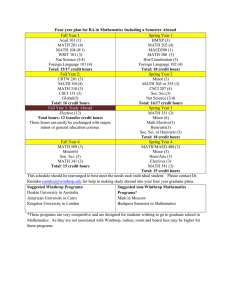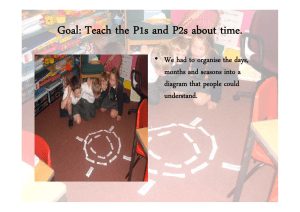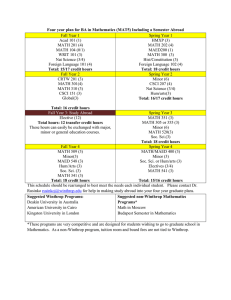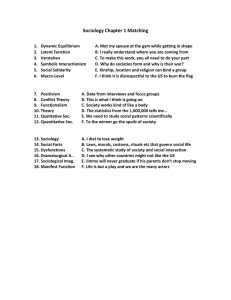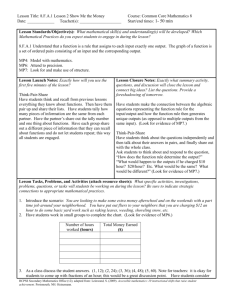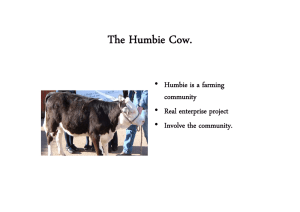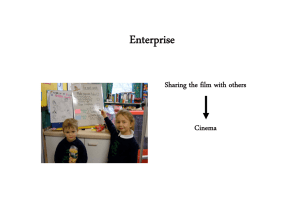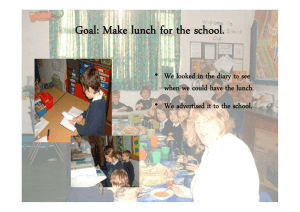Background information Economic wellbeing
advertisement
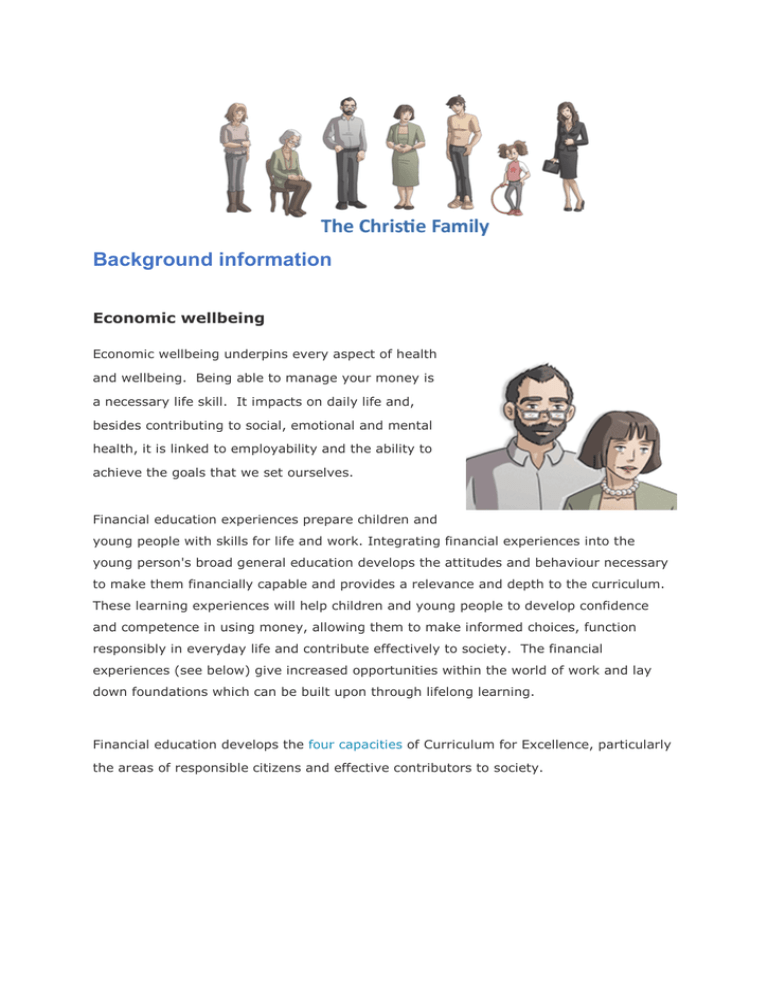
Background information Economic wellbeing Economic wellbeing underpins every aspect of health and wellbeing. Being able to manage your money is a necessary life skill. It impacts on daily life and, besides contributing to social, emotional and mental health, it is linked to employability and the ability to achieve the goals that we set ourselves. Financial education experiences prepare children and young people with skills for life and work. Integrating financial experiences into the young person's broad general education develops the attitudes and behaviour necessary to make them financially capable and provides a relevance and depth to the curriculum. These learning experiences will help children and young people to develop confidence and competence in using money, allowing them to make informed choices, function responsibly in everyday life and contribute effectively to society. The financial experiences (see below) give increased opportunities within the world of work and lay down foundations which can be built upon through lifelong learning. Financial education develops the four capacities of Curriculum for Excellence, particularly the areas of responsible citizens and effective contributors to society. Experiences and outcomes explored (in Money Talks: Family Finances resource) • Mathematics > Number, money and measure > Money > MNU 0-09a I am developing my awareness of how money is used and can recognise and use a range of coins. • Mathematics > Number, money and measure > Money > MNU 1-09a I can use money to pay for items and can work out how much change I should receive. • Mathematics > Number, money and measure > Money > MNU 1-09b I have investigated how different combinations of coins and notes can be used to pay for goods or be given in change. • Mathematics > Number, money and measure > Money > MNU 2-09a I can manage money, compare costs from different retailers, and determine what I can afford to buy. • Mathematics > Number, money and measure > Money > MNU 2-09b I understand the costs, benefits and risks of using bank cards to purchase goods or obtain cash and realise that budgeting is important. • Mathematics > Number, money and measure > Money > MNU 2-09c I can use the terms profit and loss in buying and selling activities and can make simple calculations for this. • Mathematics > Number, money and measure > Money > MNU 3-09a When considering how to spend my money, I can source, compare and contrast different contracts and services, discuss their advantages and disadvantages, and explain which offer best value to me. • Mathematics > Number, money and measure > Money > MNU 3-09b I can budget effectively, making use of technology and other methods, to manage money and plan for future expenses. • Mathematics > Number, money and measure > Money > MNU 4-09a I can discuss and illustrate the facts I need to consider when determining what I can afford, in order to manage credit and debt and lead a responsible lifestyle. • Mathematics > Number, money and measure > Money > MNU 4-09b I can source information on earnings and deductions and use it when making calculations to determine net income. • Mathematics > Number, money and measure > Money > MNU 4-09c I can research, compare and contrast a range of personal finance products and, after making calculations, explain my preferred choices. • Social studies > People in society, economy and business > 20r1 > SOC 0-20a In real-life settings and imaginary play, I explore how local shops and services provide us with what we need in our daily lives. • Social studies > People in society, economy and business > 20r1 > SOC 1-20a I have developed an understanding of the importance of local organisations in providing for the needs of my local community. • Social studies > People in society, economy and business > 20r1 > SOC 2-20a Through exploring ethical trading, I can understand how people’s basic needs are the same around the world, discussing why some societies are more able to meet these needs than others. • Social studies > People in society, economy and business > 20r1 > SOC 3-20a When participating in an enterprise activity, I can explore ethical issues relating to business practice and gain an understanding of how businesses help to satisfy needs. • Social studies > People in society, economy and business > 20r3 > SOC 3-20b I can present conclusions about the impact of the globalisation of trade on patterns of work and conditions of employment in Scotland, the UK or beyond. • Social studies > People in society, economy and business > 20r1 > SOC 4-20a I can critically examine how some economic factors can influence individuals, businesses or communities. • Social studies > People in society, economy and business > 20r2 > SOC 4-20b I can research the purposes and features of private, public and voluntary sector organisations to contribute to a discussion on their relationships with stakeholders. • Social studies > People in society, economy and business > 20r3 > SOC 4-20c I can evaluate working practices available to employees within different types of business organisations. • Social studies > People in society, economy and business > SOC 1-21a I can work out the amount of money I need to buy items, understanding that I may not always be able to afford the items I want. • Social studies > People in society, economy and business > SOC 2-21a I can identify essential goods and services, discuss the different ways to pay for them, considering the benefits and risks of each method. • Social studies > People in society, economy and business > SOC 3-21a I can understand the necessity for budgeting and determine ways to manage finance, considering possible investment opportunities, savings, risks or borrowing needs. • Social studies > People in society, economy and business > SOC 4-21a I can evaluate the suitability of finance options available for setting up and supporting different types of businesses. Interdisciplinary learning Money Talks: Family Finances addresses many experiences and outcomes across Curriculum for Excellence, not only within numeracy, but also health and wellbeing, social studies and literacy. It provides a relevant context to develop the necessary attitudes and behaviour for financial capability in an enjoyable and challenging way. This versatile resource can be adapted and used across various disciplines. IT and research skills are developed when using the Excel account statements. The spreadsheets are interactive and can be adapted by young people/practitioners to reflect the changing financial situations of each member of the Christie family. Teachers can use these spreadsheets as a 'jumping off point' to construct their own approach and statements which are relevant to a particular group of young people. The spreadsheets also provide the technology to help young learners budget effectively, manage their own money and plan for future expenses. The resource offers the opportunity to explore and use data handling software which allows the young person to search, sort, calculate, interpret, retrieve and display information. This IT connection across learning can facilitate the transfer of skills between the classroom and the world of work. (Building the Curriculum 4) The ‘Financial Education Learning Journey for Early/First and Second Levels’ on the Game On Scotland website describes how learning through financial education enables learners to: • experience challenge and enjoyment through active, relevant inter-disciplinary learning with an international perspective • improve their economic wellbeing by being able to meet financial challenges now and in the future • develop skills for life and work • understand connections to enterprise in education and employability. See suggested activities on the Getting started page for more interdisciplinary learning links. Skills for learning, life and work Money Talks: Family Finances helps children and young people develop the skills and attributes they need to be successful as lifelong learners in their adult, social and working lives. Although the focus of the skills development in this resource is mainly within numeracy, health and wellbeing, literacy and social studies experiences and outcomes, the resource also provides an opportunity to develop learners' understanding of how interpersonal skills can be used in their lives inside and outside the classroom. The learning activities within this resource provide experiences that support higher levels of social and economic advantage, placing learning within a practical and relevant context and involving the development of specific technical and professional skills for certain types of jobs. Building the Curriculum 4 pages 10 (numeracy across learning), 11 (higher order thinking) and 18 (enterprise and employability) are particularly pertinent to the teaching of financial education. See the Job Seekers Skills PowerPoint presentation for character traits and skills for all family members.
